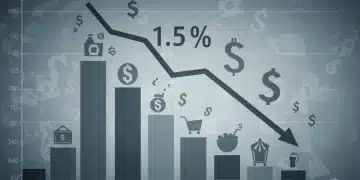Wealth tax policies under congressional review: what’s at stake?

Wealth tax policies under Congressional review aim to address income inequality, but they raise concerns about economic impacts and the effects on the middle class, reflecting a complex debate influenced by global examples.
Wealth tax policies under congressional review are generating buzz and debate across the nation. Have you ever wondered how these changes might affect your wallet or the economy at large? Let’s dive into what’s happening.
Current status of wealth tax discussions
The current status of wealth tax discussions in Congress is an evolving landscape filled with varied opinions. As lawmakers gather to debate, the implications of these policies are closely watched by citizens and economists alike. What will this mean for your financial future?
Key Players Involved
Several key players are shaping the wealth tax discussions. Politicians on both sides of the aisle are voicing their opinions:
- Progressive lawmakers advocating for increased taxes on the wealthy.
- Opponents arguing it could hinder economic growth.
- Economic analysts offering data on potential impacts.
This conversation isn’t just happening in the halls of Congress; it’s also taking place within communities. Citizens are weighing in, sharing their thoughts on social media, and reaching out to their representatives.
Public Opinion
Public opinion has shown that support for a wealth tax can vary greatly:
- Younger generations often favor wealth taxes as a solution to inequality.
- Older demographics may have concerns about how it will affect their investment returns.
- Many are simply unsure about what a wealth tax would look like in practice.
Understanding these perspectives can help clarify why wealth tax discussions remain so heated. As opinions continue to develop, it’s evident that this issue is more than just a policy debate; it’s connected to our values as a society.
As the discussions progress, keep an eye on any proposals that emerge. These could be critical in shaping not only tax policy but also the economic landscape for generations to come.
Key arguments for and against wealth taxes

The debate surrounding wealth taxes is intense, with key arguments for and against wealth taxes emerging from various perspectives. Proponents argue that these taxes can generate significant revenue to fund essential services, while opponents caution about the potential downsides.
Arguments in Favor
Supporters of wealth taxes present compelling reasons to consider their implementation:
- Reduction of Income Inequality: Wealth taxes can help bridge the gap between the rich and the poor.
- Funding Social Programs: These taxes can provide necessary funding for healthcare, education, and infrastructure.
- Encouraging Fairness: Advocates believe it’s fair to tax wealth accumulated over generations, especially if it’s not actively contributing to the economy.
These points highlight the motivations behind the push for wealth taxes. Many believe that a wealthy individual should contribute more to society given their resources.
Arguments Against
On the other side of the debate, critics raise several concerns:
- Potential for Economic Slowdown: Detractors argue that taxing wealth could discourage investment and innovation.
- Administrative Challenges: Implementing a wealth tax could create complex bureaucracy and costs associated with enforcement.
- Capital Flight Risk: There are fears that high-net-worth individuals may move to countries with lower tax rates.
Opponents often stress the importance of encouraging economic growth instead of discouraging it with heavy taxation. The arguments reflect a tension between equity and economic efficiency, making the discussion multifaceted.
As dialogue continues, understanding both sides of the argument is crucial for informed opinions. Each perspective offers valuable insights into the potential impact of wealth taxes on our economy and society.
Effects on the economy and middle class
The effects on the economy and middle class from wealth tax policies can be significant and complex. As these discussions evolve, it’s important to understand the potential consequences for everyday citizens.
Impact on the Middle Class
The middle class often finds itself at the heart of this debate. Here are some potential effects they may face:
- Increased Public Services: With revenue generated from wealth taxes, there could be improvements in education, healthcare, and infrastructure.
- Economic Pressure: Higher taxes on wealth may indirectly push middle-class taxes up if the wealthy attempt to shift their tax burdens.
- Job Creation: Investment in public services could lead to job creation, benefiting the middle class.
These points illustrate that the impacts of a wealth tax can ripple through various layers of society. The implications for the middle class are both positive and negative, depending on how this tax is structured.
Broader Economic Effects
The broader economy is also affected by wealth tax policies. For instance, proponents argue that wealth taxes can reduce inequality by redistributing wealth effectively. However, critics caution that such taxes might lead to reduced investment in businesses and innovation. If wealthy individuals or companies decide to relocate to more favorable tax environments, it could hurt domestic economic growth.
Furthermore, there is a concern that wealth taxes could discourage spending. Individuals with significant assets might cut back on consumption, which can slow overall economic growth. As discussions around wealth taxes continue, understanding their multifaceted effects on both the economy and the middle class is crucial for making informed opinions.
Comparative analysis with global wealth tax policies

A comparative analysis with global wealth tax policies provides insights into how different countries approach taxing wealth. Understanding these variations can illuminate potential outcomes for U.S. policies.
Global Examples
Many countries have implemented wealth taxes, each with unique structures and effects. Here are a few notable examples:
- France: Previously had a wealth tax on assets over a certain amount, aiming to reduce inequality. However, it was abolished in 2017 due to economic concerns.
- Spain: Currently has a regional wealth tax that varies by community, allowing local governments to set rates. This has sparked debates about fairness and effectiveness.
- Norway: Employs a wealth tax that applies to individuals based on their net worth. The revenue supports public services, making it a popular policy among citizens.
These examples illustrate how countries balance wealth taxation and economic growth, often leading to debates on effectiveness and fairness.
Lessons for the U.S.
The U.S. can learn valuable lessons from these global examples. For instance, the challenges seen in France raise questions about the sustainability of wealth taxes if they are perceived as harmful to economic growth. Conversely, Spain’s regional approach may offer flexibility that allows for local adaptations based on community needs.
It’s also crucial to consider public opinion when analyzing successful wealth tax policies. Countries with strong public support tend to see greater compliance and less resistance. As discussions on wealth taxes unfold in the U.S., examining international models can guide policymakers in crafting effective tax legislation.
FAQ – Frequently Asked Questions about Wealth Tax Policies
What is a wealth tax?
A wealth tax is a tax based on the net worth of an individual, targeting those with significant assets.
How do wealth taxes impact the economy?
Wealth taxes can potentially reduce income inequality by redistributing wealth, but they may also lead to decreased investment and economic growth.
What influences the effectiveness of a wealth tax?
The effectiveness of a wealth tax can be influenced by public support, administrative efficiency, and how well it is structured.
What are some global examples of wealth tax policies?
Countries like France, Spain, and Norway have implemented various forms of wealth taxes, each with different structures and outcomes.





